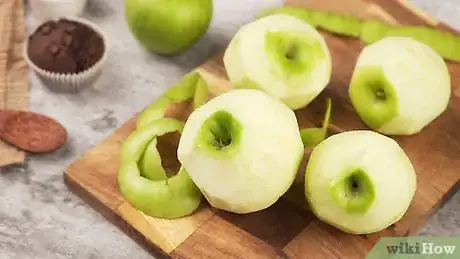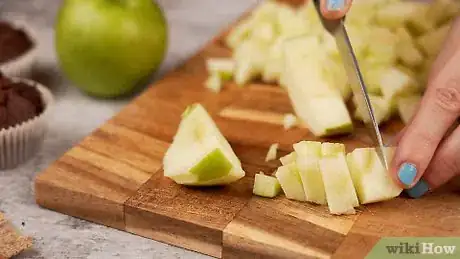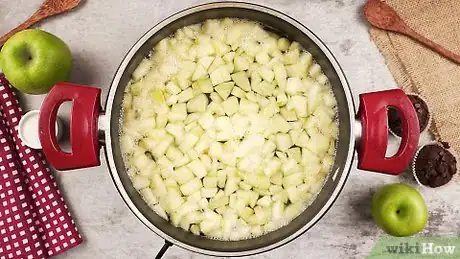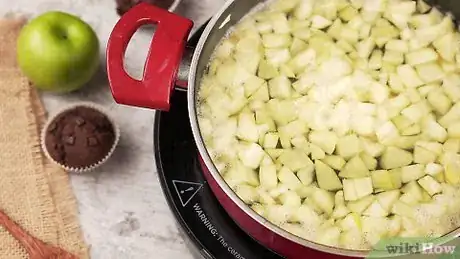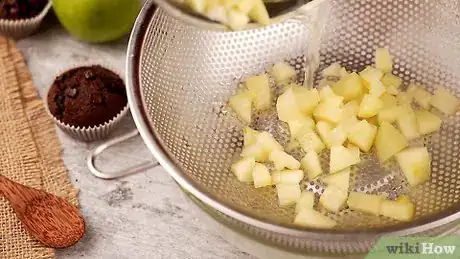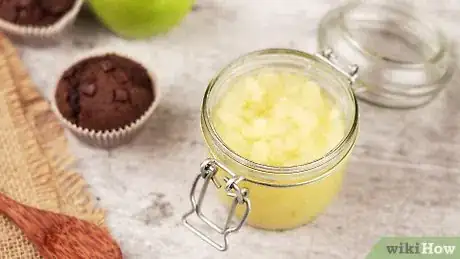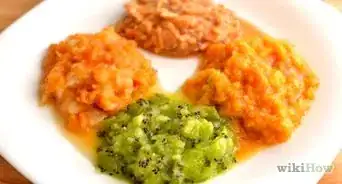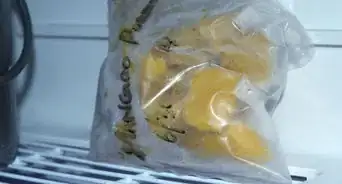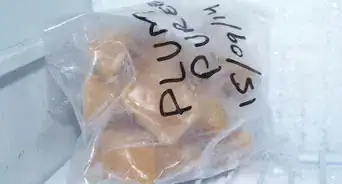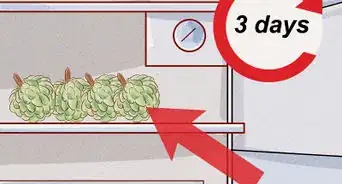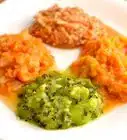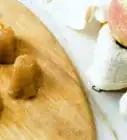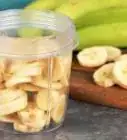This article was co-authored by Monica Moreno, MS, RD, LD/N. Monica Moreno is a Registered Dietitian and the Founder, Owner, and Lead Dietitian at Essence Nutrition in Miami, Florida. Monica specializes in nutrition consulting and school and corporate wellness programs. She holds a BA from The University of Florida and an MS in Dietetics and Nutrition from Florida International University. Monica was the dietitian for the Miami Marlins for close to 5 years, and she is currently visiting dietitian specialist at Ocean Reef Resort and Club. Monica is a member of the Academy of Nutrition and Dietetics, Nutrition Entrepreneurs Dietetics Practice Group, Integrative Nutrition Dietetics Practice Group, Collegiate and Professionals Sports Dietitians Association, and Weight Management Dietetic Practice Group. She was awarded the 2020 Coral Gables Chamber of Commerce Business Woman in Healthcare of the Year award.
There are 7 references cited in this article, which can be found at the bottom of the page.
wikiHow marks an article as reader-approved once it receives enough positive feedback. In this case, several readers have written to tell us that this article was helpful to them, earning it our reader-approved status.
This article has been viewed 202,352 times.
When babies are moving from the bottle to solid food, fruit and vegetable purees are great transition foods to avoid choking.[1] Luckily for parents, making these isn’t too difficult. Since apples are sold at every grocery store and pretty widely enjoyed, apple puree is a perfect food for babies to try. All you’ll need are some apples and water, and you’re ready to go!
Ingredients
- Medium sized apples (1 apple yields 5 oz of puree)
- Water
Steps
Prepping the Apples
-
1Wash and peel your apples. You can use whatever kinds of apples you’d like for this recipe, although sweeter, less tart apples are typically better for baby food. Fuji and Gala apples are both sweet and cook great, and Granny Smith apples actually sweeten when you cook them.[2] Although you’re going to be removing the peel from the apples, it’s best to wash them thoroughly first just so you start with a clean piece of fruit. After they are washed and dried, use a vegetable peeler to remove the skin. If you don’t have a peeler, you can always use a knife.[3]
- You can rinse your apples under water, or use a mixture of three parts water and one part vinegar. This will help to kill any bacteria on your apples.
- You can use as many apples as you like for this recipe. One apple yields approximately five ounces of puree, so you can plan accordingly.
-
2Core your apples. You don’t want to include the apple seeds and tough core in your puree. You can core your apple by using a tool made specifically for this task, which goes through the apple and removes the entire center. If you don’t have this tool, keep it simple and just use a knife.[4]
- To remove the core with a knife, first cut your apple into slices. Then, grab each slice individually and trim off the tough part along the inner edge.
- Your apple slices don’t need to look picture perfect. Just make sure you’ve successfully removed all of the core and seeds from the good “meat” of the apple.
- Make sure you do this part slowly and carefully, to avoid cutting yourself on a sharp knife or apple coring tool.
Advertisement -
3Slice into chunks. By chopping up your slices into small chunks, you’ll make it easier to eventually blend and mash together.[5] Aim to cut your apple into pieces about the size of dice. Once you’ve washed, peeled, sliced, and chopped your apples, you’ve done all the prep work necessary for this recipe.
Boiling the Apples
-
1Put the apple chunks and water in a pot.[6] Make sure you use a pot that is large enough to fit all of your apple chunks, enough water to cover them all, and enough extra space to allow the water to boil without spilling over. Dump all of your prepared chunks of apple into the pot, and then add enough water so that they are all submerged.[7] You can use tap water or filtered water – whichever you prefer. Place a lid on top of your pot.
-
2
-
3Let your water and apples simmer. After it reaches a boil, turn the heat on your stovetop down to low heat. Then, let it simmer uncovered for ten minutes. Set a timer or keep your eye on the clock to make sure you double-check them as soon as ten minutes have passed. Use a spoon to fish out an apple chunk and check it’s texture. You want the apple chunks to be soft enough that they will be mashed or blended easily.[10]
- If the apples aren’t tender after ten minutes, continue checking them every five minutes until they are soft enough.
- The longer your apples simmer, the more likely they are to lose precious vitamins. It’s best to remove them from the heat as soon as they are tender in order to preserve their health benefits.
Mashing the Apples
-
1Drain the water from the pot. It is easiest to do this by pouring the contents of the pot into a strainer. If you don’t have a strainer, put the lid into the pot at an angle, leaving a small space for water to drain out while catching the apple chunks. Once you’ve drained all of the water from the pot, place it back down on a non-heated surface.
-
2Rinse your apple chunks with cool water. If you skip this step, the apples will remain hot from the water. When they’re this hot, they will continue cooking and losing vitamins and minerals. By rinsing the apples with cool water, you will stop the cooking process and the apples will stay “as is.”[11]
-
3Mash your apple chunks.[12] Use a potato masher to mash the tender apple chunks into the puree. If you don’t have a potato masher, you can use a large fork to do this, although you may end up with a chunkier puree. For a super smooth apple puree, feel free to put your soft apple chunks into a blender or a food processor.[13]
- Many blenders have a "puree" setting, which is what you will use for this step. If your blender has speeds, use the fastest setting.[14]
- For very young babies, you can add a bit of water to thin your puree as needed.
-
4Store your apple puree in the refrigerator. This will keep it fresh for longer. When it is time to serve it to your baby, you can warm it in the microwave for a few seconds or simply serve it cold. You can also combine it with other fruit and vegetable purees to create delicious combinations.[15]
- If you aren’t going to finish the puree within three days, pop it in the freezer. It can last in there for up to three months.
Expert Q&A
-
QuestionHow do you make banana baby food?
 Amy ChowAmy Chow is a Registered Dietitian and the Founder of Chow Down Nutrition, a family and child nutrition consulting service in British Columbia (BC), Canada. With over nine years of experience, Amy has a special interest in pediatric nutrition, food allergy management, and eating disorder recovery. Amy holds a Bachelor’s degree in Nutritional Sciences from McGill University. She gained her clinical experiences at residential and outpatient eating disorder treatment programs as well as for BC Children’s Hospital before starting her own business. She has been featured on Find BC Dietitians, Dietitians of Canada, Food Allergy Canada, Recovery Care Collective, Parentology, Save on Foods, National Eating Disorder Information Centre (NEDIC), and Joytv.
Amy ChowAmy Chow is a Registered Dietitian and the Founder of Chow Down Nutrition, a family and child nutrition consulting service in British Columbia (BC), Canada. With over nine years of experience, Amy has a special interest in pediatric nutrition, food allergy management, and eating disorder recovery. Amy holds a Bachelor’s degree in Nutritional Sciences from McGill University. She gained her clinical experiences at residential and outpatient eating disorder treatment programs as well as for BC Children’s Hospital before starting her own business. She has been featured on Find BC Dietitians, Dietitians of Canada, Food Allergy Canada, Recovery Care Collective, Parentology, Save on Foods, National Eating Disorder Information Centre (NEDIC), and Joytv.
Registered Dietitian Banana is a great food to give to a baby because it's a very soft texture. It can be just mashed up with a fork, or add a little bit of breast milk and formula to thin it out, it can also be given as finger food starting around six months. To do this you can clean the peel well and remove an inch off the top of the banana, expose some of the meat inside and let the baby hold on to the peel. I would not give the banana as is without the peel because it can become very sticky.
Banana is a great food to give to a baby because it's a very soft texture. It can be just mashed up with a fork, or add a little bit of breast milk and formula to thin it out, it can also be given as finger food starting around six months. To do this you can clean the peel well and remove an inch off the top of the banana, expose some of the meat inside and let the baby hold on to the peel. I would not give the banana as is without the peel because it can become very sticky. -
QuestionWould it still taste fine if you were to blend the apples without boiling them before hand?
 Community AnswerCooking the apples enhances their sweetness and softens them for easier blending. Your apple puree might be okay without boiling, but it depends on your apples, how particular you are about the taste, and what purpose you have for the puree.
Community AnswerCooking the apples enhances their sweetness and softens them for easier blending. Your apple puree might be okay without boiling, but it depends on your apples, how particular you are about the taste, and what purpose you have for the puree. -
QuestionCan I blend apple when boiling it?
 Community AnswerYes.
Community AnswerYes.
Things You'll Need
- Knife
- Vegetable peeler (optional)
- Apple coring tool (optional)
- Medium sized saucepan
- Potato masher/fork
- Blender/food processor (optional)
References
- ↑ Monica Moreno, MS, RD, LD/N. Registered Dietitian. Expert Interview. 17 June 2021.
- ↑ http://www.epicurious.com/archive/seasonalcooking/farmtotable/visualguideapples
- ↑ http://www.parents.com/recipes/baby-food/how-to-make-baby-applesauce/
- ↑ http://www.parents.com/recipes/baby-food/how-to-make-baby-applesauce/
- ↑ http://www.parents.com/recipes/baby-food/how-to-make-baby-applesauce/
- ↑ Monica Moreno, MS, RD, LD/N. Registered Dietitian. Expert Interview. 17 June 2021.
- ↑ http://wholesomebabyfood.momtastic.com/applebabyfoodrecipes.htm
- ↑ Monica Moreno, MS, RD, LD/N. Registered Dietitian. Expert Interview. 17 June 2021.
- ↑ http://www.parents.com/recipes/baby-food/how-to-make-baby-applesauce/
- ↑ http://www.parents.com/recipes/baby-food/how-to-make-baby-applesauce/
- ↑ http://www.parents.com/recipes/baby-food/how-to-make-baby-applesauce/
- ↑ Monica Moreno, MS, RD, LD/N. Registered Dietitian. Expert Interview. 17 June 2021.
- ↑ http://www.parents.com/recipes/baby-food/how-to-make-baby-applesauce/
- ↑ http://www.blenderbuzz.com/control-and-settings-too-matter/
- ↑ http://www.parents.com/recipes/baby-food/how-to-make-baby-applesauce/
- ↑ http://www.dailymail.co.uk/femail/article-79807/What-best-way-use-apple-pur-e.html
- ↑ http://kidshealth.org/en/parents/feed47m.html
- ↑ Monica Moreno, MS, RD, LD/N. Registered Dietitian. Expert Interview. 17 June 2021.
About This Article
To make apple puree, start by peeling and coring your apples to get rid of the skin and seeds. Then, use a knife to cut the apples up into small chunks. Next, put the apples in a pot filled with enough water to cover them all and then bring the water to a boil. Once it starts boiling, turn the heat down to low and let the apples simmer, uncovered, for 10 minutes. After 10 minutes, drain the apples and rinse them with cold water so they stop cooking. Finally, mash the apples with a potato masher or toss them in a blender to make your puree. To learn how to choose apples to make your puree with, keep reading!

